Running Up That Hill – What Would Your Deal Be If You Were FINA God For The Day?

Editorial & Essay On Reform – Let’s exchange the experience, sings Kate Bush in her Deal with God that’s Running Up That Hill to the top of music charts the world over almost four decades after she first poked the creator to “get him to swap our places”.
Running the universe known and unknown may be a somewhat bigger job than reforming FINA but in the spirit of stranger things, Bush’s deal with Blake’s quandary – Lamb, Tyger! Same Architect’s Dream? – offers a useful approach to gauging an Aquatics reform process in its infancy.
Normally, around this time the day after World Championships are over, I’d run a review of highlights and trends. Not this year. There were, of course, many terrific moments of high achievement in Budapest, among highlights:
- Elijah Winnington Joins Club Of Aussies Greats Boxing Clever For 3:41.22 World Title A Year After Tokyo Trauma Almost Broke Him
- Leon Marchand Chases Down Phelps World Record With 4:04 Global Textile Best As France Relishes Golden Prospect For Home Paris Olympics
- Queen Of The 1500 Katie Ledecky Makes It Global Gold No4 With Grimes Getting Silver Ahead of Pallister
- Thomas Ceccon Celebrates The Time Of His Life With 51.60 World Record Stunner
- Popovici Pulversises WJR For 1:43.21 Victory In 200 Free Ahead Of Hwang & Dean In The Race, Phelps & Thorpe & In Textile Just 0.07 Shy Of Agnel’s Apex
- The Mighty Milak Mesmerises With Three Lengths Circa 2040 Before Settling On A World Record 1:50.34 Circa 2032 – Marchand Past Esposito, 2002
- Popovici Pops The First Worlds 100-200 Freestyle Double Gold Since Montgomery 1973
- David Popovici Paris Bound With A Touch Of Thorpey, A Hint Of Hoogie, A Pinch Of Phelps In His Preparation & Process
- Leon Marchand At The Double With 1:55.2 Bounce That Beat dad Xavier’s Silver in 1998 0.04sce Shy Of Cseh’s 2009 European Standard
- O’Callaghan High Five For Australia In 100 Free Ends GDR Dominance Of All-Time Medals As Stubblety-Cook takes 1st Dolphin Title In 200 Breaststroke
- Kristof Milak Joins The 100-200 ‘Fly Double Club With Phelps & Le Clos
- Sarah Sjostrom Claims Record Fourth Straight 50 Fly Crown With Dominant 24.95 Victory
- Kaylee McKeown Anointed By Queen Krisztina Egerszegi After 200 Back Triumph Before Dolphins Crack Mixed Free WR
- Katie Ledecky Joins Michael Phelps In The High-Five Club Of Aces With Fifth 800m Free World Title
- Ben Proud The Pride Of Britain As First GBR Winner Of 50 Free World Crown
- Summer McIntosh A Pioneer As 1st Canadian World 400IM Champion & 1st 15-year-old Winner Since Great Tracy Caulkins in 1978
- Sarah Sjostrom Sits On Cusp Of Toppling Phelps As Most Medalled Swimmer In World-Titles History In Dashing Final In Budapest
- Mind The Gap – Paltrinieri 14:32.80 For 3rd 1500 World Title Delivers Knockout Blow To Finke’s Last-Lap Fury Just Shy Of Sunset For WR
- Dutch Ace Sharon Van Rouwendaal Takes Her First 10km World Title To Add Budapest Gold To Rio Olympic Crown
- Paltrinieri & Acerenza Punch Italian 1-2 Ahead Of Wellbrock As Europe Celebrates Distance-Free Dominance On Lupa Lake
Alongside all of that, it is fair to note, absenteeism – through illness, injury and choices made in order to cope with a cluttered calendar and stay true to long-term Olympic objectives – made Budapest 2022 something of a first rip in the major tear to come in the thread of World-Championship history by 2025. More on that below along with some “Running up that Hill” notes on what I’d do if swapping places with FINA leaders, even for just one day.
Before that, how do you think FINA reform is going? Comments are open on this article should anyone feel the urge (editor’s rights reserved on abuse, provocation, multiple profiles and the like…). Here are my thoughts, with facts and opinions on a range of issues followed by my “Deal with God”, or ‘what I would do about it’ if it were up to me.
I’ll raise only a few of the many issues, upside and downside, in play as FINA reforms, while suggesting what I would do on some of the big questions still facing the regulator, some of those related to the questionable culture and nature of the Olympic Movement and governance structures and policies that say one thing – ‘no politics’ – but don’t do what they say because politics has been and remains an inherent part of Olympic sport on many levels, regardless of the detrimental impact on athletes, coaches and other stakeholders.
I raised that matter in this swift thread:
The Deal On Key Issues …
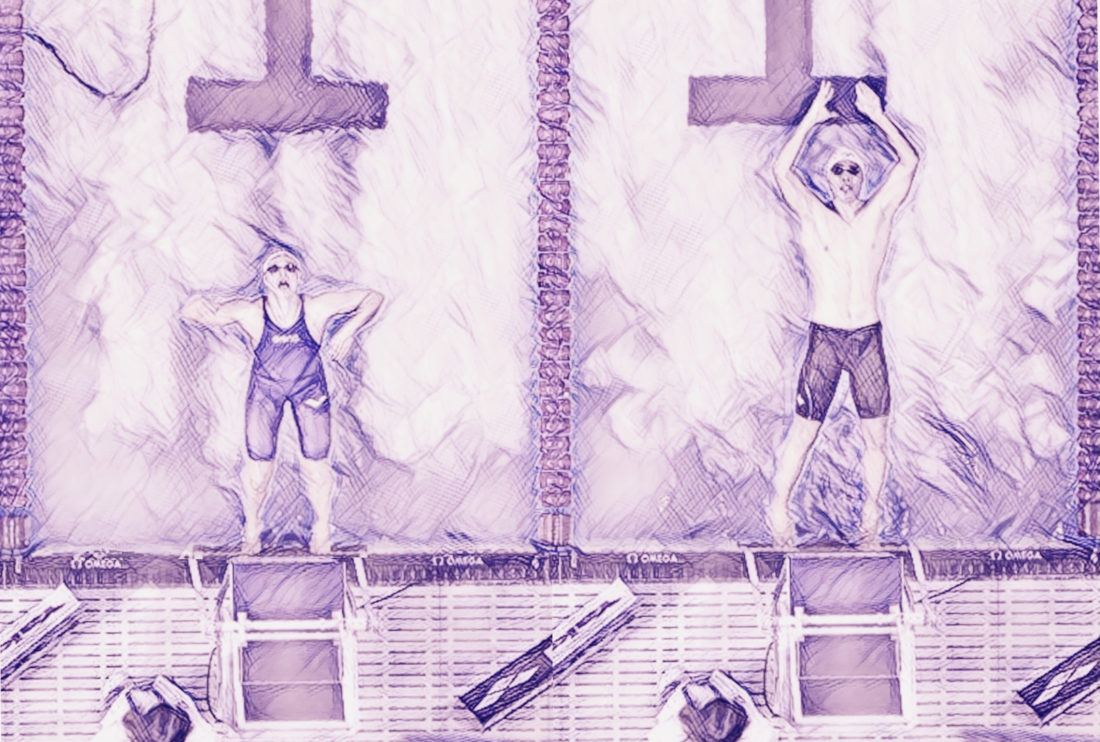
First, the good news.
We leave Budapest in the rear-view mirror with the first phase of FINA reform done, a spirit of serious intent to turn word to deed having taken hold in the upper echelons of governance at the global regulator for Aquatics.
Here are a few hopeful highlights of processes underway and certainly worth celebrating:
Transgender policy: FINA engaged a panel of experts long before the name Lia Thomas had been heard of outside the athletes own teams (male as Will pre-2021-22; and trans woman as Lia, 2021-22 winter season). That’s right. The arrival of Lia Thomas was critical to open discussion about the form inclusion of transgender athletes in swimming should take but had nothing to do with the FINA process, which began the moment the International Olympic Committee handed the matter back to International Federations to come up with rules and policies suited to each specific sport.
In short, here is what FINA decided on recommendation of world-class experts in various fields, including human development, law and human rights:
- any athlete who grew through male puberty from boy to man before identifying as a transgender woman will have no access to female sport on grounds of fairness, the science not only in existence, despite trans lobby denials, but conclusive when it comes to the impact of male-development advantage in female sport;
- the meaning and shape of an “open” category” is yet to be determined – and a working group is to be formed and is scheduled to report back by the time FINA gathers for the World short-course championships in Melbourne come December.
SOS Coverage:
- Swimming Ban On Transgender Athletes Who Grew Through Male Puberty Set To Be Gold Standard As Rugby, Athletics, Football Lean The Same Way
- Male Puberty Rules Out Access To Female Racing As FINA ‘Gold-Standard’ Policy Safeguards Fair Play For Women & Creates Open Category For Transgender Athletes
- Swimming To Put Transgender Inclusion Policy To Vote Of Nations Sunday With Fair Play For Women The Make-Or-Break Issue
- World Coaches – WSCA – Urge FINA To Back Model Of Trans Inclusion That Protects Women Through Birth-Sex Catgorisation
Like no other issue, the transgender debate highlighted what can be done if expertise is engaged and then coupled to the interests and welfare of a very large stakeholder group – namely, female athletes, without interference of a director given permission to take the final decision on all things as if FINA were the private plaything of s ingle paid employee.
While the final model for transgender inclusion is not yet in place, the pace of decision-making has been healthy and the outcome one that is supported by the vast majority of aquatics nations/FINA members (at the vote, 71% in favour), women’s sport advocates and campaigners, scientists and the World Swimming Coaches Association. It also appears to have deep support among athletes and a high level of support among media pundits.
Among those who disagree, the key two lines of criticism of a FINA policy being widely seen by peer sports organisations as an industry gold-standard to follow are:
- transgender athletes have been banned and the policy is therefore not inclusive.
- transgender athletes are banned from female sport and that is discriminatory against (trans) women because they are women, many of those involved in the sports discussion going as far as to call themselves female.
- there is a lack of science and evidence to show there is any impact of male development of boy to man through puberty, largely down to the impact of one of the keys to a natural division and difference in male and females sexes, testosterone
The answers to such criticism, in the same order:
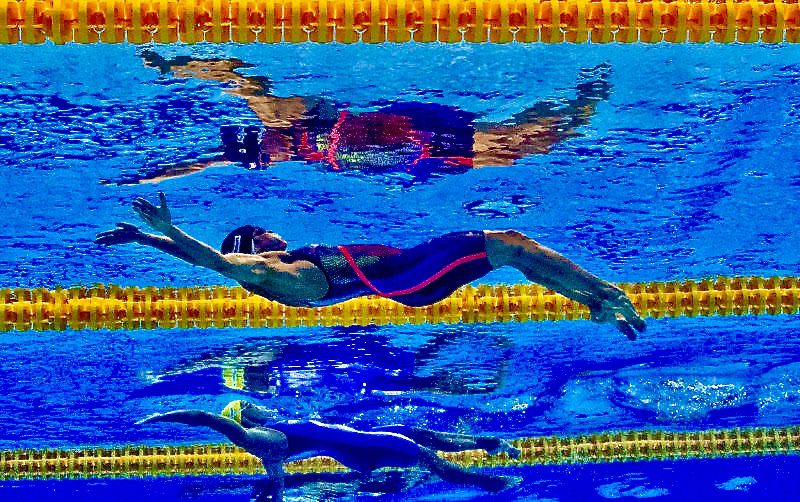
- untrue – the policy has inclusion built in, just as swimming and other aquatic disciplines have inclusion built in to its model of categorisation on many levels, including age, sex, various Paralympic groupings, military, student, school, college, university, geography and nationality, for example. No-one is suspended, barred or excluded provided rules are upheld; rules which include categorisation that serves as a key pillar in the nature, infrastructure and governance of sport: Fair Play.
- trans women who identify as women have a right to do so and a right to have their choice respected. What they do not have a right to is access to female sport, for very good reasons. The argument that trans women are female does not hold up: “of or denoting the sex that can bear offspring or produce eggs, distinguished biologically by the production of gametes (ova) which can be fertilized by male gametes.” – Oxford dictionary – no trans women grown through male puberty can be described as female under that definition.
- claims of “no evidence” or even “too little” evidence are clearly untrue: watch the video of presentations at FINA Congress alone or follow the work of the likes of development biologist Dr. Emma Hilton and sports scientist Ross Tucker for deeper understanding. And if required, consider the biggest experiment on athletes in sports history – the GDR’s State Research Plan 14:25: If teenage girls can be androgenised into all-but certain winners in female sports such as swimming, through the administration of Oral Turinabol, with the effect of elevating testosterone levels and making them more like boys but with far less testosterone running through their bodies than nature delivers to boys during puberty and for much of life after it, then it surely stands to reason that male puberty gains, many of them irreversible even with HRT after a transgender choice is made, should never be allowed into female sport, in the same way, albeit from a different angle, that girls who take Oral Turinabol are barred from female sport.
In some ways the transgender issue evoked memories of the shiny suits saga of 2008-09: the truth was plain to see all along but it took a fight and great deal of vile discourse and insult – ironically, much of it from the very NCAA American college environment at the heart of the trans debate – to get to the right outcome.
The big difference this time round: the approach and determination of FINA’s leadership.
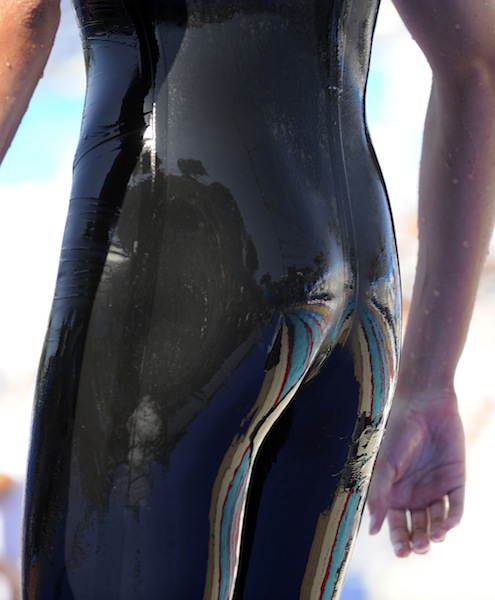
On shiny suits, key FINA leaders fought for the survival of non-textile not only until the votes were in but beyond having their views rejected. Had Bob Bowman not said “my boy (Mr. Phelps) won’t be showing up until you sink the shiny to the seabed in chains”, the January 1, 2010 deadline would not have been set and the Rome 2009 vote would have led to a fudge and a compromise for some seasons to come as those in favour of the shiny worked on finding ways to justify the birth of a new sport.
On transgender, the matter was, rightly, handed over to experts and when those experts spoke, their evidence and science and opinions were coupled to the lived experience of athletes such as those who lived and competed and were robbed by the GDR doping era, such as Summer Sanders and Cate Campbell – and then a sensible, fact-based policy emerged. This was no age-old FINA reactive response to a crisis. Rather, it was the closest FINA has been to proactive in many a decade on an issue of fundamental importance to athlete welfare and fair play.
Bravo to all concerned.
Other good developments with much work to be done:
GDR – truth and reconciliation long overdue
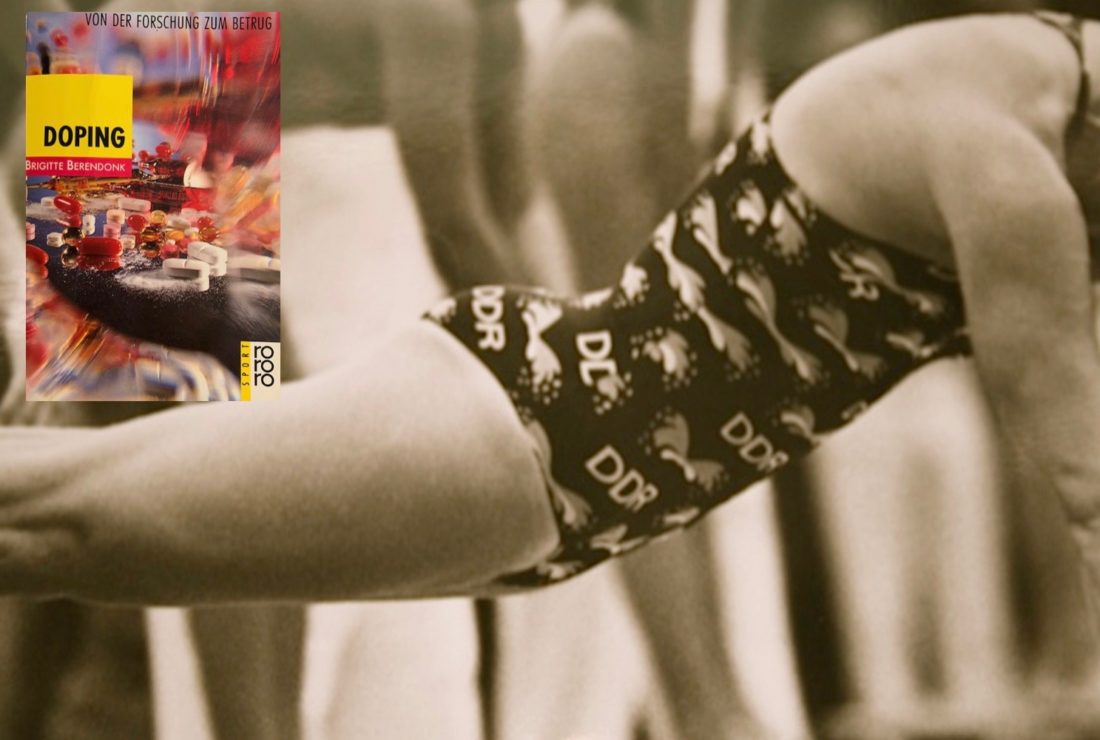
The FINA president honoured a pledge to take a look at the evidence sent to FINA in 2014 with a proposal for a reconciliation process related to the GDR doping era. That proposal, backed unanimously by the FINA Media Committee, and related evidence never made it to the FINA Bureau for consideration, Husain Al-Musallam told SOS. He asked to see it and when he received it, he put it to the latest Bureau last year. Within a matter of weeks, one decision and a policy direction has been set:
- Decision: FINA Finally Sends Strong Message In Reform Process By Stripping “Disgraced” GDR Dr. Lothar Kipke Of 1980s Honour 20 Years After Criminal Conviction
- Policy direction and support for reconciliation processes: Swimming’s Reformists Lead Hope For Those Denied By GDR Doping
Running Up That Hill: With the IOC dithering and playing fool on the GDR issue, FINA must be prepared to taken a lead, regardless of Olympic medals. It is not in the IOC’s gift to decide whether FINA runs and truth and reconciliation process in its own jurisdiction and involving medals handed out at all World Championships between 1973 and 1986. It is time to remind the IOC and its boss Herr Bach, a man who must surely have read in his native German language at least some of the comprehensive and towering evidence of cheating behind the Berlin Wall, that their “humanitarian” vision for the movement will never be taken seriously if the biggest experiment on athletes in sports history is treated to a wilful blind eye in 2022 onwards. High time for men in blazers to understand how the world is changing and how that will affect their legacies in the history of the Olympics they and those who work for them will not pen.
Integrity Unit – a work in progress
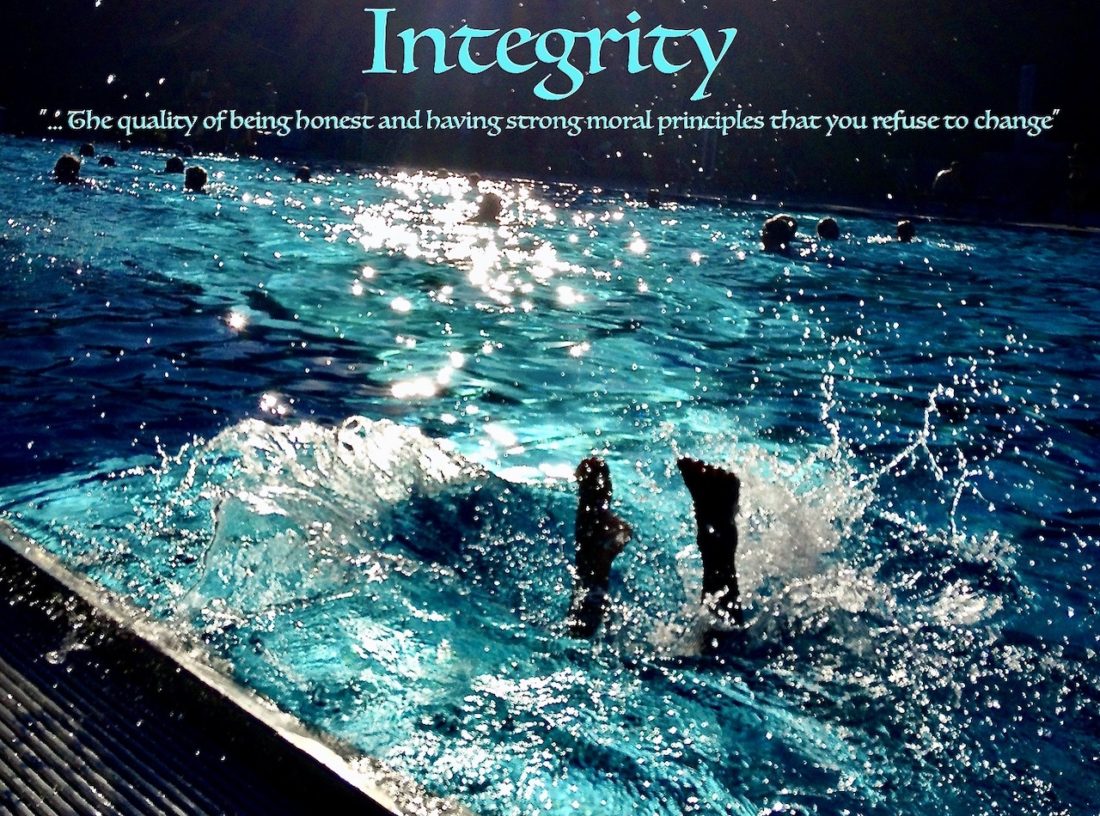
At this stage we can only applaud the creation of the unit. Quite how it will work in practice and whether it will be as independent and effective as the word says it should be can only be determined in time and judgement of that and the office holders at the unit can also only come with time.
One comment that can be made straight away: those named for the unit include some who have been linked to FINA, USA Swimming and peer organisations for decades and it is truly hard to see how such people could be considered to be “independent”. Again, time will tell.
And time ticks slowly on a long-overdue move: the unit will not be operational until January 1, 2023. Along the way, it is hoped that the unit will establish its own website and set out its terms of engagements with stakeholders and others who may wish to bring forward complaints and issues for adjudication.
The January 1, 2023 start sets a date for this issue:
The IOC’s stance on GDR Doping has long been a three-line whip in Olympic sport but late last year in an interview with The Times and SOS, Husain Al-Musallam, president of FINA, expressed empathy with women affected. In keeping with the spirit of reform underway at FINA, he said:
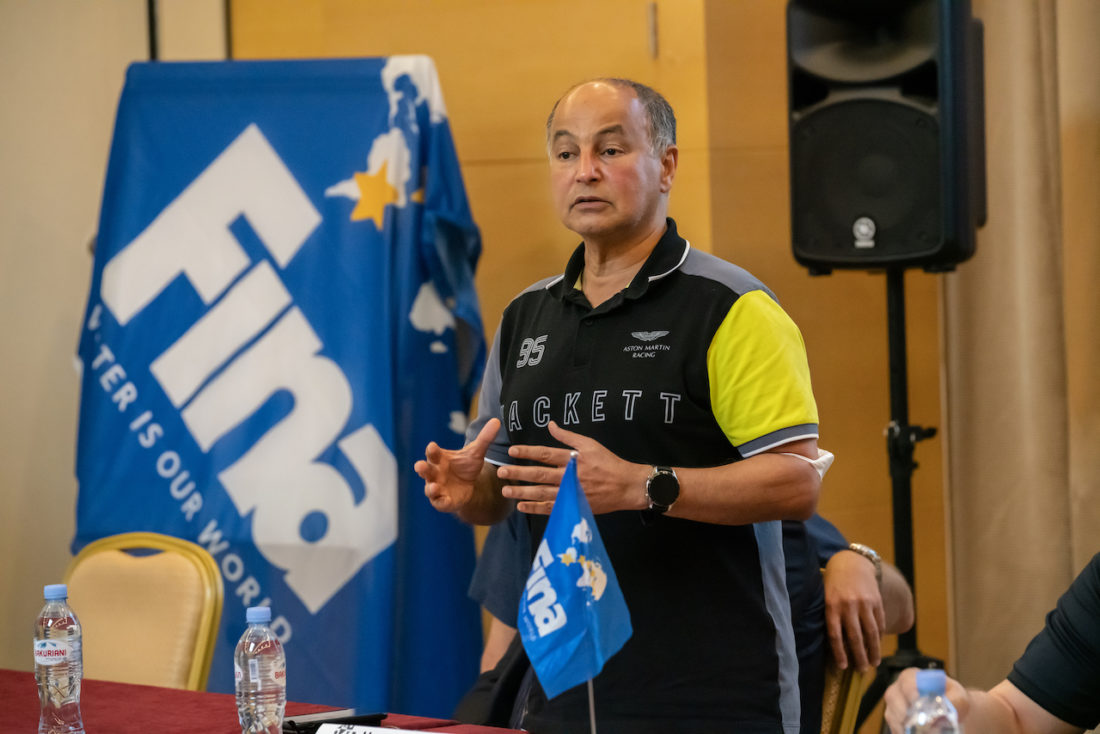
“Fina understands the concerns of athletes who have competed against others subsequently proved to have cheated. Athletes work their entire lives for a mere chance to compete for a medal, yet alone win one. So when athletes are denied the reward they worked so hard to achieve, Fina must do everything it can to right this wrong. Once established, the independent Aquatics Integrity Unit will investigate the matter to determine what recourse may be taken in support of Ms Davies and all similarly-situated other aquatics athletes.”
Husain Al-Musallam – photo courtesy of FINA
In that sense, there is no need to tell FINA what I might do if I were running up that hill. The support is there. How word will be convenient erred to deed remains to be seen. By the time the Integrity Unit opens its doors, it will be:
- 50 years since the GDR doping crisis started two unfold;
- more than 30 years since concrete evidence emerged of a systematic state doping plan, complete with the details of substances, dosages, administration schemes, names of doctors, athletes and confirmation of the IOC-accredited laboratory as a factory for cheating;
- 22 years since the German doping trials concluded after convictions criminal and otherwise were handed down to swathes of officials, doctors, scientists, coaches and politicians for the harm they inflicted on under-age athletes fed a diet of Oral Turinabol and other performance-enhancing, life-altering and health-destroying chemicals;
- 7 years since the Bundestag agreed the second tranche of many millions in compensation aimed at GDR doping victims, on one side of the coin, of course;
- 31 years since there was enough evidence of the systematic doping program for the IOC and IFs to understand that generations of women from around the world had been robbed of their rightful rewards and status and opportunities, both at the moment, in their time and then down the long years of life ever since.
So, happy to hear FINA leaders openly supportive of a process that could lead to truth, reconciliation and recognition. It would be long overdue – and given that, no plaudits yet for any sports organisation or leadership. As things stand, the reality has been sorrow and pain for thousands of female athletes around the world, their families, coaches and communities.
There has simply been no action by mainly male regulators and governors who have turned a blind eye to the sporting crime of the 20th century and the biggest experiment on athletes in history. Time there was. Time to call to account any who stick to a tired old line of ‘let sleeping dogs lie’ (they never do) that emerged from the malaise of Juan Samaranch and spread to the legal departments of federations nervous of massive claims (they still ought to be but against a cultural backdrop more helpful to victims and survivors these days).
Athletes’ Committee
In the realm of what has good aspects to not but runs the risk of being more of the same: a new Athletes Commission was formed in Budapest.
“The results of the first FINA Athletes’ Committee elections were announced with recently-retired swimmer Alia Atkinson (JAM) to chair the Committee from 2022-2026,” FINA noted.
Athletes, we are told, voted. Good. It would have been much better, however, to see the vote numbers released with the names of those voted into office, in the traditional and transparent way in which democratic processes tend to reported far and wide around the world.
Doubt hangs over the vote in this sense: a Russian diver was elected and it is hard to imagine in the current environment that we’re looking at a situation in which that diver was elected in a process involving large numbers of athletes from all over the world voting on athlete representation. The votes raise the following questions, among others:
- how many voted – how many voted for which athletes?
- how many from which nations voted?
- did Russian athletes have a vote – and if so, why (on what grounds), given they are banned from their raison d’être: competing?
- is it the case that relatively very few athletes bothered to vote and if so, what should and what can FINA do to improve engagement?
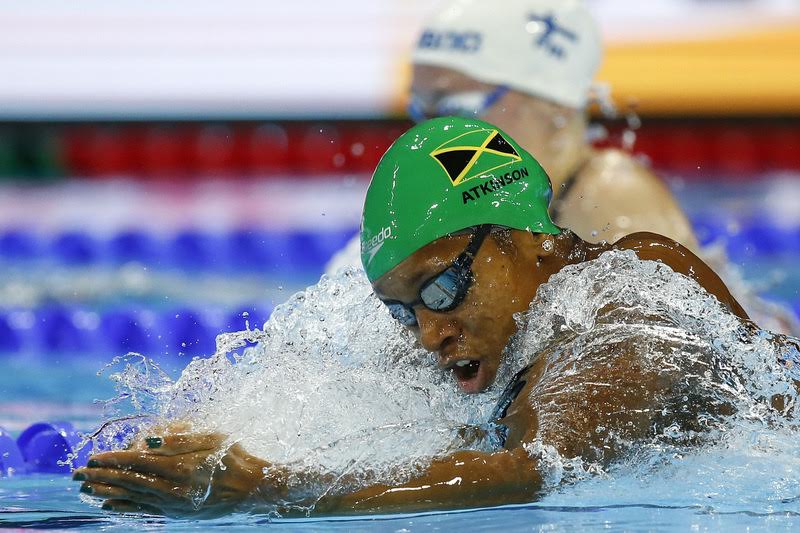
Other questions are for the future: will Atkinson and Co be able to openly raise issues on behalf of athletes or will everything be filtered within a culture of the commission working for/within FINA first at the expense of raising an independent athlete voice that genuinely represents the likes of the athletes who kicked back in the row over ISL Vs FINA and will do so again if it were to come to it.
There seems little point in replacing the likes of Penny Heyns and others as athlete representatives if the same fate awaits those who follow: an inability to speak the genuine athlete voice because that is not what FINA wants and anyone seen to be representing their peer group more than FINA could count their days (you can ask scores of folk who served on FINA committees down the years and understood early on that only those who go along to get along got to stay, or at least got to stay with the ability to hold their head high).
For example…
FINA Vs ISL – Time To End The War

If athletes were to take a vote and ask FINA to settle its differences and legal case with the ISL so that the League and FINA could work together in the future to the benefit of athletes seeking an alternative to four straight years of the same World long-course Championship format, what would FINA say? What would it do?
Running Up That Hill: I would get the matter settled, stop the slaughter of bills exchange, reach out to the Ukraine head of the ISL and ask to make a new start in a Putin-free era (no, no matter what happens now isn Ukraine, Putin has no place in Olympic sport and the moment Olympic sport says he and the blood on his hands are welcome back is the moment Olympic sport joins all those innocent Ukrainians in their mass graves). There are those in FINA leadership positions that would surely be anathema to Konstantin Grigorishin, including those who were deposed and gave testimony fit to make the skin crawl (see “The Best Swimming Deep Dive Of The Year” in our 2021 SOS awards, honouring Alex Perry and his expose “The Plot to Kill The Olympics”).
And that theme plays into this one…
A Deal Of Competition Calendar Chaos
Brent Nowicki, FINA Director, is tied in some respects to the clutter of each deal made before he arrived, all of it compressed by the Covid pandemic into tight windows and costly contracts
As things stand, there is a serious risk that by 2025, the thread of World Championship history will be thin enough to snap, with record medal counts and more no longer worth referring to because nothing in the sport is comparable in a world where history held one such global gathering every four years, then two, then one every year for four years.
The impact and consequence of such decisions, beyond the immediate impact of quality on events, is obvious, including turning this era into a moment where the USA has singular targets when other nations have been forced to have two or three because regional and continental events were already on the calendar long, long before a 2022 World l-c championships was ever thought of.
Running Up That Hill: Cancel Kazan 2025. This is one journalists that will not be going anywhere near Russia for as far as the eye can see. I won’t be alone. FINA needs to consider the question: do you seriously think that three years from now Russia and Ukraine will be at peace, reparations paid and the reconstruction of the entire sovereign nation of Ukraine under way? I don’t nor do I think Russia will be at Paris 2024 for the Olympics unless the monster is toppled and gone. Under the circumstances, bite the bullet: cancel Kazan 2025, move Doha to that slot and end the growing unease, frustration and even a touch of anger, over plans to stage a World long-course Championships in January of Olympic year.
On the potential for having only three relays qualify for Paris 2024 Olympic action at Fukuoka 2023 and the rest having to do so at Doha in January of Olympic year: scrap the idea as a very poor one that favours the few at the expense of the many. Fair Play is the cornerstone of sport. Never talk it lightly.
FINA need not be worried about legal and financial claims: any host that refuses to see the logic in complying with necessary moves in the best interests of athletes and aquatic sports is clearly not fit to host the sport’s biggest showcase outside the Olympic Games. Any claim would be very costly: no return to that venue for decades to come, regardless. Deal done. Game over. Move on and do it in the best interests of athletes. Win, win for FINA, regardless of a lost contract that won’t break the bank.
Technical Committees
And there were new compositions, too, for FINA’s Technical Committees. There’s more to be said at some later date on all of that status-quo governance structure that ought to be a part of the reform process. Here’s a question and an example: given that the head of any technical committee ought to have a very high level of expertise in the relevant field, I wonder why the diving technical committee is run by an official from Kuwait, given that Kuwait has no divers and no elite female athletes in any aquatics sport.
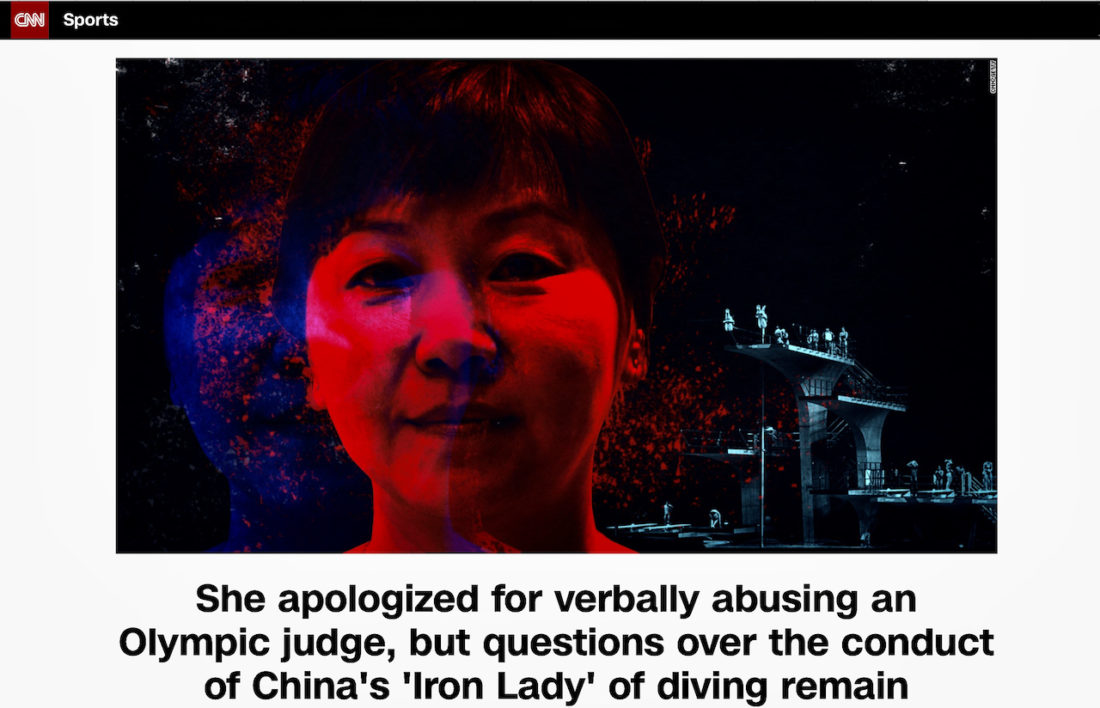
This may well be seen as a discriminatory mark. Let me make it clear: my comment inevitably notes the nationality but not for the same of noting the nationality: expertise is what I’m getting at here, and expertise in relationship to power. The Bureau liaison for the diving committee remains Zhou Jihong, a Chinese former Olympic champion who will know far more about diving than the committee chair, in my humble opinion, but a liaison officer that remains in place despite complaints of a serious nature levelled against her after behaviour she was forced to apologise for in a sport where athletes are rewarded on both objective and subjective grounds.
In the meanwhile, while Zhou is forgiven and remains in power, Simon Latimer, the New Zealand official who was among those bringing the complaints against Zhou – complaints for which she apologised, and, therefore, we assume, complaints on issues she acknowledged and admitted to – found himself ostracised by FINA leaders and dumped from the Diving Technical committee. Shame on FINA leaders who talk of integrity and transparency and good governance but then act in ways that suggest that we cannot take them seriously.
Running Up That Hill: Zhou should have been asked to step down, regardless of influence and pressure from China. Her actions were inappropriate and had the same been observed in the behaviour of others, including athletes and coaches and even officials from elsewhere, it woulds not have gone unpunished, in all likelihood.
A glance at the diving technical committee raises serious questions about the balance of expertise and power in governance and the ability of governors to deal with complaints of a serious nature when those are levelled at people in positions of power and influence, stretching to influence of a nation that funds certain FINA activities, hosts events and has a money to spend in an environment where the taxpayer will not ask authorities to justify the budget. Times are changing and the way sports organisations fund their way through life is also about to change. A good moment to adjust not follow the same tired old path.
One more thing: reinstates Simon Latimer, diver and diving expert. Any move to ostracise those who submit complaints against leadership when leadership get it wrong is a move in the wrongs direction. It sends a message to all stakeholders and victims: don’t you dare complain if your complaint will in any way embarrass a leadership figure linked to a nation that funds FINA activities as host and home of sponsors. Such things boild down to this: bad governance verging on the corrupt. Precisely what ‘new FINA’ wishes to avoid, is it not?
The Deal On Other Reform Promises
All above issues, in common with many others, need attention but are not a barrier to progress and evolution at FINA. As Brent Nowicki correctly noted, “there’s not much we can do before 2024-25” when it comes to calendar chaos and getting the train back on tracks and making the competition cycle and selling points of aquatic sports fit for the 21st Century.
Where I see sticking points is here in this promise from Husain Al-Musallam when I asked about the cultural shift he insisted on at FINA: ” … if they don’t change, they will have to go – and there are different ways to achieve that. We are going to shift the culture …”. In that interview with me, he gave the “they” until June 2022 to confirm with this overriding position statement from the president:

“It is not enough to have good athletes and good coaches and good officials at the swimming pool. Without a good governing body, the whole thing will collapse, so this is the time that we need to come together and talk to each other. We need to create a good environment where we work together under the same roof and there is transparency for everyone.”
Husain Al-Musallam
Great. So how does that fit with these two scenarios:
- Dale Neuburger is the Treasurer of FINA and at the same time has been a director of the International Swimming Hall of Fame, a private enterprise that requests and receives money / funding from FINA. In my opinion, it matters not a jot whether anyone stands outside the room for any vote: those two roles represent a conflict of interest. There are also related issues that need attention.
Running Up That Hill: I would ask Neuburger, who has fended off challenges on conflicts of interest before, but not under the new regime and independent inquiry of an Integrity Unit, to step down from one of those roles forthwith. Then, ISHOF would be asked to consider selling Swimming World, not because the editorial independence of that media outlet has suffered – as a result of its relationship with ISHOF, in my opinion and in my lived experience – but because FINA cannot be seen to be funding nor should it be funding an independent media outlet, directly or indirectly, through association with ISHOF, SW’s parent company.
If ISHOF remains the official repository of FINA history (a relationship that has fallen well shy of potential for decades, in some ways because of the conflict in official vs independent), that relationship should not prop up the work of any independent media outfit, the conflict of interest obvious for both parties.
Here’s a note on that lived experience that forms a small part of what leads me to my conclusions:
Some issues are major, others minor. I’ll leave it for you to decide where this one fits, it being July 4. It was Independence Day 2019 when SW appointed me Editor in Chief and John Lohn Assistant Editor to a great fanfare of “We back Independent Journalism” and a commitment to doing just that. Within 24 hours I’d received emails from the then publisher showing me an email with nothing other than many lines of questions marks and an exclamation mark. It was sent to SW’s publisher by Neuburger. When the answer was: yes, we’re committed to independent journalism and are putting a great team in place to deliver just that, another mail came back: cancel all my subscriptions. For any member of the FINA leadership to seek to interfere in independent journalism in that fashion is problematic. Anyhow, my contract was broken and I was happier to be out than in under those circumstances, though I remain very proud of the fine team I pout together, which is doing fine work under John’s leadership.
My feelings about the importance of independent journalism are all the keener in the context of this:
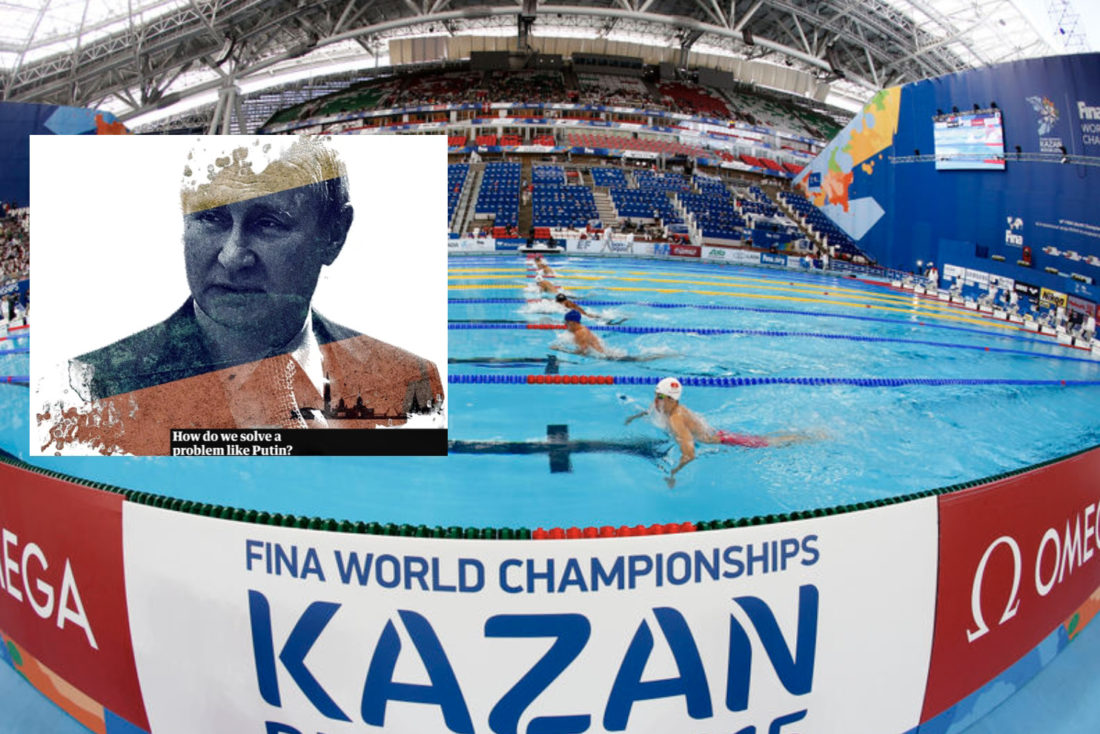
Back in 2015, FINA leaders agreed to a proposal drafted by JTA Associates, a British outfit wedded to promoting all things Olympic: over four months FINA would pay the agency 150,000 to promote the swim organisation ahead of Kazan World titles in Russia. Part of the proposal included a plan to “discredit” the work of this author and others, including members of the American and World Swimming Coaches Association who had criticised FINA on two grounds related to Russia:
- in autumn 2014, Putin was granted the FINA Order in a decision taken by a small number of executives without reference to the wider Bureau, the board or top table, of the federation, a move that ran counter to a constitutional obligation to include all Bureau members in awards decisions. This author spoke to seven members of the Bureau who confirmed that they had never been asked about Putin’s suitability, let alone asked to take a vote on the matter, which was effectively the work of then then president of FINA Julio Maglione, of Uruguay.
- on the way to Kazan, Russia had become the worst offending nation in aquatics when it came to adverse anti-doping findings, with 23 active positives on its record and several cases that appeared not to have been reported. Those included the cases pdf two teenagers who tested positive for EPO but were let off in return for the name(s) of those who had supplied and administered the banned blood foster. The name of a doctor was given and that doctor appeared at a hearing presided over by a member of the FINA Bureau but in the middle of the hearing, a local police chief related to the doctor entered the room and demanded that the process end there and then. It did and all went on their way. The cases were not reported and the FINA Bureau member defaulted on an obligation to report the cases to the World Anti-Doping Agency (WADA). All of those and the case of a female swimmer who was a repeat offender were covered up, this author reported. My reports proved to be correct t (see below).
- Within weeks of Maglione driving the honour to his friend Putin, the Russian doping crisis made headlines around the world following reports by Nick Harris in the Mail in Britain and the Anti-Doping investigations team at ARD led by Hajo Seppelt in Germany. It was the start of a cycle of shame that would see Russia barred from the Rio 2016 and the Tokyo 202one Olympic Games, though many Russian athletes were allowed to compete under the neutral flag of the IOC.
Back to the female swimmer’s positive. It belonged to Yana Martynova. The FINA record simply shows that it all happened in July 2015 but that hides a multitude of obfuscation: when a newspaper in Russia reported in September 2015 than she had missed the Kazan meet and a subsequent World Cup because of a suspected positive doping test, she denied it and said she had suffered a shoulder injury.
President of the Russian Swimming Federation Vladimir Salnikov told the newspaper: “We had no reason to doubt that [injury] was the reason that she withdrew from the World Cup … that was the problem, she was engaged in rehabilitation after the World Championships.”
It was as if no-one was aware of the positive doping test and yet the subsequent timing revealed when the case was finally reported shows clearly that all relevant officials in Russian swimming, the swimmer and Russian anti-doping must have known the truth of the matter.
In October that year, the Russian media reported that a “B” test of an “adverse finding” confirmed the presence of the banned substance found in a surprise check on Martynova days before the start of the Kazan world titles.
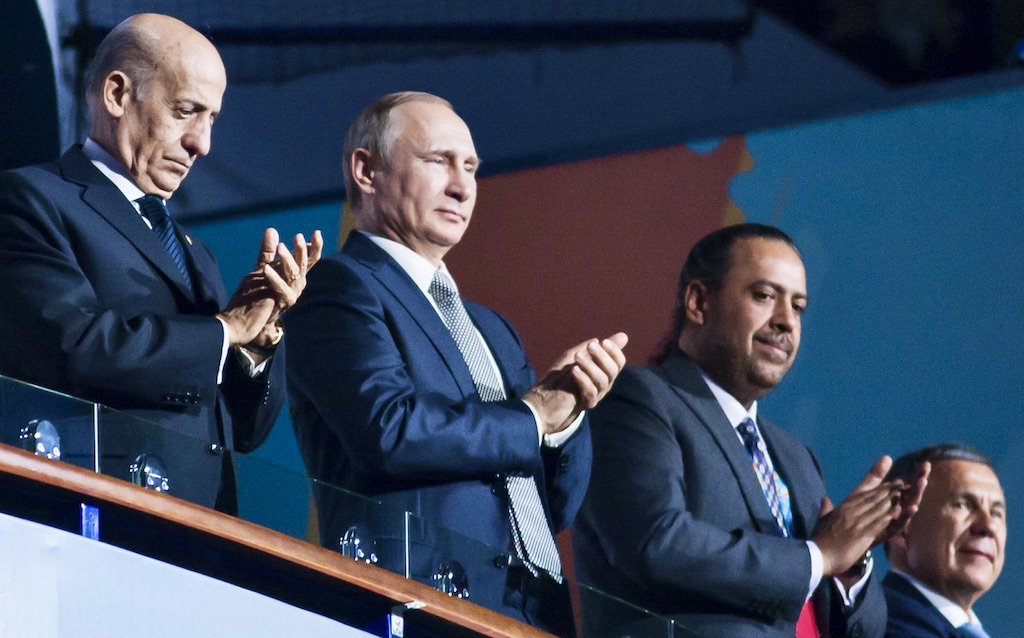
In June 2016, the fuller truth emerged when a top Russian anti-doping source confirmed that Martynova was told on the eve of racing at the World Championships in Kazan that she had tested positive for Ostarine, also known as MK-2866, and would not be able to race.
Ostarine is a class of drug called SARMS: selective androgen receptor modulators. An experimental drug developed in 2009 by the company Gtx in an effort to fight muscle-wasting diseases, Ostarine has made its way into the realms of sport of late. It is listed in the World Anti-Doping Agency Code’s banned substances list under “Anabolic Agents”.
Then national champion over 400m medley on 4:41.71, Martynova was named on Russia’s world-titles team but did not then swim in Kazan. In March 2016, Martynova was missing from the Olympic trials in Russia, along with others. Two days later, Vitaly Mutko, Putin’s then sports minister, confirmed the positive test but stated that the swimmer would appeal a four-year ban. That case was lost ands Martynova’s career ended.
At the time, this author also reported six unreported doping cases in China. All were denied – until they were confirmed by WADA, which has been informed months later than it should have been under deadlines set out in the Code.
It was against that backdrop that FINA opted to pay an agency for a plan that included work to “discredit” my work. Where they might have said thanks for exposing the truth and keeping our sport clean, FINA leaders opted to ostracise any who might stand in the way of its PR exercise with Putin. In June 2022, that all looks all the more toxic than it already did at the time.
In short, the above is the tip of an iceberg of reasons FINA had to thank me but opted to damage my business, ostracise, have its then director or tolerate its then director call advertisers to threaten them with loss of FINA business if they didn’t drop support for my work – and so and and so forth.
Meantime, the covering up of Russian doping cases leads us to the second trawl of events that simply do not meet the standards of behaviour set by the Reform Committee in recommendations approved by the new FINA leadership in June 2021.
- In Budapest, Antonio da Silva, the Portuguese official who took the throne at LEN, the European Swimming League, in February this year after a move to oust incumbent president Paolo Barelli in the midst of an investigation over allegations of financial irregularities at the organisation, drifted through the Press Centre with Nick Davies in tow.
Several mainstream media colleagues took note and sent me links to the stories from January 2017 with headlines such as Sebastian Coe ally Nick Davies sacked for lying over secret payments; Sebastian Coe’s former aide Nick Davies says he was conned into accepting £25,000 ‘bribe’ to bury Russian doping tests; IAAF’s Nick Davies banned after cash payment cover-up – Athletics body’s former chief of staff admits taking payments to cover up Russian doping.
I mention this not only in the context of the Russian doping cases in swimming but because of the questions I put to Davies as da Silva’s media man related to questions facing the now LEN president in Portugal. The questions were sent on January 28 and to this day, there has been no reply, neither from Davies nor da Silva.
Why does that matter? Well, beyond questions of professionalism at a time when Davies is now running a chunk of media operations at LEN and good colleagues are about to join that operation and may also have questions to ask in order to protect themselves, there are a series of relevant issues raised in our SOS FINA Reform Series (full links below), including this Reform Committee recommendation approved by the FINA Bureau, including Da Silva:

“Finally, the Reform Committee is mindful to note that FINA’s historical “no communication communication” approach with its members, partners, Athletes and the media must immediately cease.”
Installation, Bauhaus – photo by Craig Lord
Simple. Or perhaps not. Sadly, it would seem that the practice is well and truly alive and kicking. Perhaps president Al-Musallam could have a word.
Ultimately, if reform is to be successful, as Al-Musallam has rightly pointed out, the culture must shift and that must happen from the top downwards. That part of the reform process is not yet even in its infancy, it would seem to me.
Running Up That Hill: I’d be instruction Sr. da Silva to do the right thing – answer the questions in keeping with the FINA Reform commitment. I’d be mentioning the same to Nick Davies too and reminding him of the damage done at the IAAF and the damage done by JTA’s proposal of 2015 at FINA, damage with a drop of blood running off the contract in the context of what happened next with Putin and pals.
Integrity and reform should not be treated with the same disrespect as the Olympic Charter and FINA Constitution have been, where deed only follows word if convenient to politics, power, self-interests, gains that always get the gold ahead off athlete interests.
At FINA Congress, there were words of praise for Maglione and others on whose watch bad things unfolded, not through fate but deliberate intent. Reform also means finding a way to forgive, not forget, to thank but not praise people for poor service and a watch on which athletes and others were harmed. Reform means being humble enough to thanks the coaches and others who pressed for reform long before Cornel Marculescu left the stage, long before a reform committee was applauded for its work. Reforms means nothing it you pay yourself on the back and then shuffle your feet and look embarrassed because stakeholders had called for the right thing at a time when not was not in vogue with the powers that were to tell it like it was and call for the changes required.
In this reform process, Al-Musallam and Nowicki have shown themselves to be men who stick to their word by pressing ahead with deed. The sooner they roll that culture out down the ranks the better, for all concerned.
Zhou should be removed. China and Kuwait have positions of power and also are rich nations. Hmmm. Wonder why they are in charge of things. Excellent take on the Diving TDC. It’s accurate as all heck.
So much corruption and Chinese-led influence in the technical committees. China pays and gets what it wants.
Fancy a Russian athlete representative in the current state of international affairs.
Fina still garbage and operating in murky water